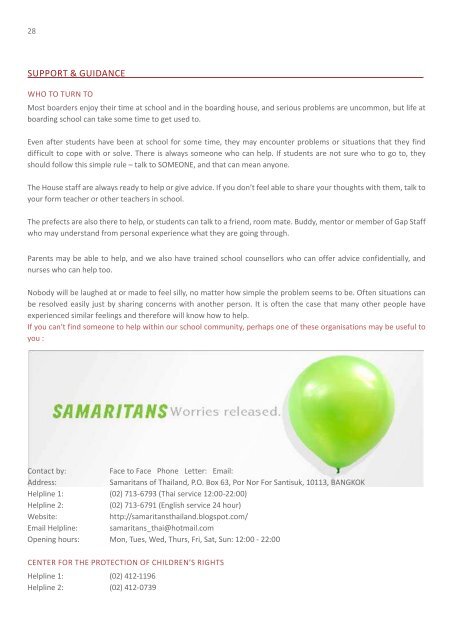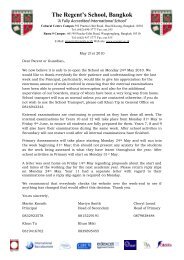Boarding Handbook 2013/14 - Regents School
Boarding Handbook 2013/14 - Regents School
Boarding Handbook 2013/14 - Regents School
You also want an ePaper? Increase the reach of your titles
YUMPU automatically turns print PDFs into web optimized ePapers that Google loves.
28<br />
29<br />
Support & Guidance<br />
Who to turn to<br />
Most boarders enjoy their time at school and in the boarding house, and serious problems are uncommon, but life at<br />
boarding school can take some time to get used to.<br />
Even after students have been at school for some time, they may encounter problems or situations that they find<br />
difficult to cope with or solve. There is always someone who can help. If students are not sure who to go to, they<br />
should follow this simple rule – talk to SOMEONE, and that can mean anyone.<br />
The House staff are always ready to help or give advice. If you don’t feel able to share your thoughts with them, talk to<br />
your form teacher or other teachers in school.<br />
The prefects are also there to help, or students can talk to a friend, room mate. Buddy, mentor or member of Gap Staff<br />
who may understand from personal experience what they are going through.<br />
Parents may be able to help, and we also have trained school counsellors who can offer advice confidentially, and<br />
nurses who can help too.<br />
Nobody will be laughed at or made to feel silly, no matter how simple the problem seems to be. Often situations can<br />
be resolved easily just by sharing concerns with another person. It is often the case that many other people have<br />
experienced similar feelings and therefore will know how to help.<br />
If you can’t find someone to help within our school community, perhaps one of these organisations may be useful to<br />
you :<br />
Contact by:<br />
Face to Face Phone Letter: Email:<br />
Address:<br />
Samaritans of Thailand, P.O. Box 63, Por Nor For Santisuk, 10113, BANGKOK<br />
Helpline 1: (02) 713-6793 (Thai service 12:00-22:00)<br />
Helpline 2:<br />
(02) 713-6791 (English service 24 hour)<br />
Website:<br />
http://samaritansthailand.blogspot.com/<br />
Email Helpline: samaritans_thai@hotmail.com<br />
Opening hours: Mon, Tues, Wed, Thurs, Fri, Sat, Sun: 12:00 - 22:00<br />
Academic support<br />
Students are fully supervised by staff during prep times. Any spare time during prep should be used for reading English<br />
books, or for revision of course work. Staff are always available to help if any difficulties arise with prep. They maintain<br />
links with form teachers and Key Stage Co-ordinators. Extra tutoring can be arranged with parental permission and<br />
financing.<br />
Support teachers are available to boarding students each Tuesday evening, and appointments can be made if necessary<br />
through the appropriate Head of House.<br />
Some advice for students about homesickness<br />
Feeling homesick when you first come to boarding is the most natural thing in the world. Most of the people around<br />
you have felt homesick at some time. Just ask the staff. Most of them are far from their home countries and their<br />
parents. They know how you feel !<br />
Things you can do to make homesickness less of a problem<br />
• Get used to sleeping alone before you come. In a boarding house you may share a room (most boarders do) but<br />
you will sleep alone in your bed.<br />
• Get used to sleeping with the light off or buy a small plug-in night-light, which you can bring with you.<br />
• Get used to going to bed, getting up and eating meals at the same time. You will do these things when you are in<br />
the boarding house.<br />
• A favourite teddy bear or other soft toy can make sleeping alone easier. Choose one to bring with you.<br />
• Talk to your parents about phone calls. Too many calls from home can make the problem worse. Arrange a time<br />
each day to contact each other by phone and then stick to that one call a day.<br />
• Bring some photos of home and family with you to put in your room.<br />
• Look at the calendar and plan the times when you will go home. It might be every weekend or only once in the year<br />
depending on your situation. Mark the home visits on the calendar and look forward to them.<br />
Once you are here:<br />
• Read your house letter of introduction and get to know the routines<br />
• Talk to other boarders about home, especially to your room mate or buddy<br />
• Stick to your phone call schedule. Once a day is enough, more than that only makes it worse. Don’t forget to tell<br />
your parents all about the good things. They miss you too and want to know you are happy!<br />
• E-mail your family if there is a computer at home and have them e-mail you with all the news about brothers,<br />
sisters, pets, etc. Keep in touch with your friends at home in the same way.<br />
• Keep busy, join in the activities and avoid spending time alone in your room.<br />
• Talk to the staff about the way you feel. In the junior houses staff will help by reading a bed-time story<br />
• Celebrate important days, like your country’s national day. Tell other people about your country, ask about theirs,<br />
and get together with other students from the same part of the world to talk about home.<br />
Center for the Protection of Children’s Rights<br />
Helpline 1: (02) 412-1196<br />
Helpline 2: (02) 412-0739












